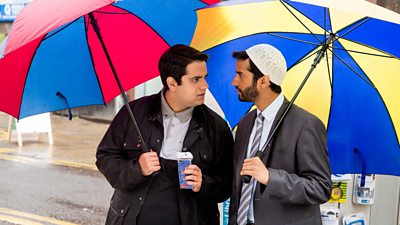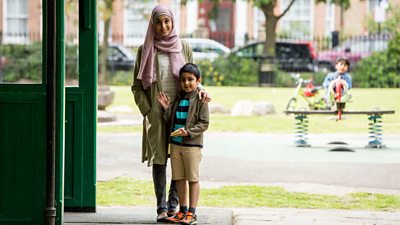
It is March 2014. The first three BBC iPlayer shorts have just been officially launched and I am sat with the producer. She tells me that the BBC wants to make a sequel to 'My Jihad'. And the first thought that goes through my head is; "Why?"
In the moment that Fahmida turned around and gave Nazir the look he had wanted, I was certain that my time with these characters was done. This was the ending I'd always known they'd have.
The story was complete.
When people watched the short and asked me what happened next I sympathetically replied that I didn't care. I had never, during the entire writing and production process, even once thought about what happens to these characters after that look. Truth be told; it didn't interest me.
The story was complete.

Except ...
Unless your story climaxes with the end of existence there's always more to say, more to tell. A script is like a picture. It captures a brief moment and holds it up for the world to look at. But the picture isn't the whole. A multitude of lives, events and experiences exist outside of the frame.
And so, epiphany; the story is not complete.
To Be Continued ...

Writing is difficult. It is time consuming, arduous and painful. Its saving grace is its autonomy and freedom. The writer can sit alone and write anything he or she wants. That's the beauty of it. You can conjure up whatever characters and situations you please, and allow those strands to take you wherever you want to go.
Writing a sequel is not like that! There are many constraints that have already been set by the existence of the characters and situations from the first episode. For example, I couldn't suddenly decide that Nazir is a secret agent because this would be a betrayal of the character. And as much as it would have tickled me to turn Fahmida into a serial killer, that just was not true to the story being told.

You want more constraints? Each episode of 'My Jihad' had to simultaneously be seen as;
- a continuation of the story begun by episode 1
- a single short movie in-and-of itself
- one part of a 4 episode story
Luckily, there was a great team of people on hand to offer feedback, and this leads on to probably the best advice I can offer budding writers; learn to love collaboration.
A writer can often spend so much time in his or her head that their writing begins to suffer. Tunnel vision sets in. Glaring problems become invisible. Staggering inconsistencies can be seen as justified plot twists. So when people critique your work, listen carefully. They may not be able to articulate the exact problem with the script. They may not use words like 'structure' or '2nd act issues' or 'momentum' (or, even worse, they may use those exact words!), but their thoughts are valuable, so learn to read them.

I hope every writer out there gets a chance to work through the pre-production process. For some it will be illuminating and rewarding. For others it will be a horrendous experience. Because we often painfully dredge our work up from deep within us, we can become very possessive over every single word. We may react poorly to feeling like we have to change something. If you find yourself in such a situation, don't be afraid to argue for what you believe is right for your work. Learn to articulate your views in a manner that doesn't alienate others. Be firm but not stubborn, so that if the contrary argument is stronger, you can accept it gracefully.

And take pride in your work. That's not to say that we should be arrogant. It simply means we should aspire to do the best work we can. Better minds than mine have said that a piece of writing is never perfected; it simply reaches a point at which its author feels comfortable abandoning it. But that's no excuse to not strive for perfection. Put in the hours, the effort, the graft; and if, at the end of it all, you can smile and honestly say that you've done your best; walk away and head towards your next challenge. There's a whole multitude of lives, events and experiences outside of the frame!
Watch 'My Jihad' on BBC iPlayer now (Episodes 2-4 go live on BBC iPlayer on Sunday 28 June 2015)
Find out more including watching interviews and clips
How did 'My Jihad' get its name? Shakeel explains on the TV Blog
Watch the other Original Drama Shorts for BBC iPlayer
Download the scripts from our script library
Read Shakeel's blog for the first episode of 'My Jihad'
Listen to a review of 'My Jihad' on BBC Radio 4's 'Front Row' (at 23'30" into the programme)
Two stars of 'My Jihad' on BBC Asian Network's Nihal show (at 1 hour 13' into the programme)
